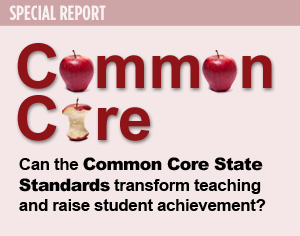All but five states have signed on to the Common Core State Standards in math and English, but states have been more tentative about picking up new science standards released in April. Known as the Next Generation Science Standards (NGSS), the new guidelines, which call for a greater emphasis on problem solving than previous standards and teaching of core ideas that cut across physics, biology and chemistry, such as proportionality and cause and effect, are generating as much controversy as their sister standards.
The standards were developed by a consortium of 26 states that have committed to giving serious consideration into their adoption. But so far just five states, including Maryland, Vermont, Rhode Island, Kansas and Kentucky have adopted the NGSS.
Officials in Kentucky faced backlash over the inclusion of such topics as evolution and climate change in the standards (although evolution was included in Kentucky’s previous science standards). But aside from political reactions to the NGSS, the new guidelines are also facing objections from an academic standpoint.
Some opponents say the science standards are vague, stress scientific practices too much instead of covering more theory and that some states already have standards that are superior to the NGSS. Most notably, the Thomas B. Fordham Institute, a right-leaning education think tank, gave the standards a ‘C’ grade, a lower rating than grades it assigned to the current standards of 13 states.
Comparing NGSS to Washington, D.C.’s current standards, for instance, the Fordham study said the new science guidelines are subpar because they omit essential content, such as the topic of covalent bonding in high school chemistry, overemphasize engineering practices, like coming up with problems and models to solve them, and fail to integrate sufficient math into science learning.
The National Science Teachers Association, who support the science standards and had a hand in their development, strongly disagreed with the study. Executive director David L. Evans said in a statement that thousands of educators and experts were involved in the development of these new standards and an informal poll found 83 percent of those who responded believe they would have a positive impact.
“The NGSS is based on a current and robust body of research established by our nation’s leading scientists. In contrast, the Fordham review is based on personal opinions and lacks serious substantive research. We need to prepare students for the next generation, not the last,” he said.
Paul Bruno, a middle school science teacher from California – a state which got an ‘A’ in the Fordham ratings – has gotten attention for his critique of the NGSS. He said that basic content knowledge was needed before students could understand scientific and engineering practices, or how scientists ‘do science.’
“Unfortunately, I think the next generation science standards don’t provide the breadth of content knowledge students would need to be able to really think like scientists in a variety of contexts and the content they do provide is not always specified and articulated,” Bruno said in an interview.
The deficiency in content coupled with the lack of clarity specifically in what is expected from teachers means students won’t pick up the content knowledge they need, Bruno added. He believes the standards stress too many things at once and have the potential to overwhelm students.
Ravit Golan Duncan, an assistant professor of science education at Rutgers University, said there has been a continuous shift in the academic world over the past 100 years between teaching the skills needed to do science and focusing more on content knowledge. Far from viewing the NGSS as overemphasizing practices, Duncan sees the standards as a worthwhile attempt to integrate both theory and practice.
“Scientists don’t just sit there coming up with facts; they come up with theories which are these large explanations for how the world works,” Duncan said in an interview. “If we want a public that understands how science is done and scientific knowledge develops, then we need them to understand how those norms and practices and strategies work that scientists’ use.”
This was what the National Research Council, a research body that advises the government on education as well as other matters of public policy, set out to do by drafting the framework for new science guidelines that were later picked up by a consortium of states and ultimately developed into the NGSS.
Bill Badders, president of the NSTA, said there was no way to determine ahead of time how effective the science standards would be, but that he believed they would help improve students’ understanding of science.
“It isn’t perfect,” he said of the NGSS. “But it is the roadmap for what we’re going to be doing and how we should look at standards and science for many years to come.”




